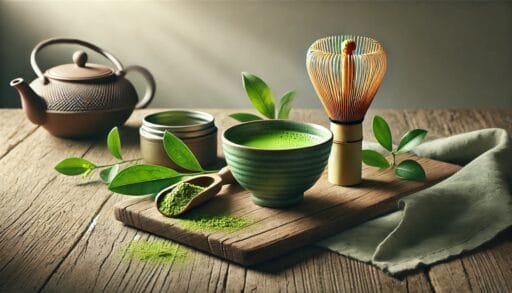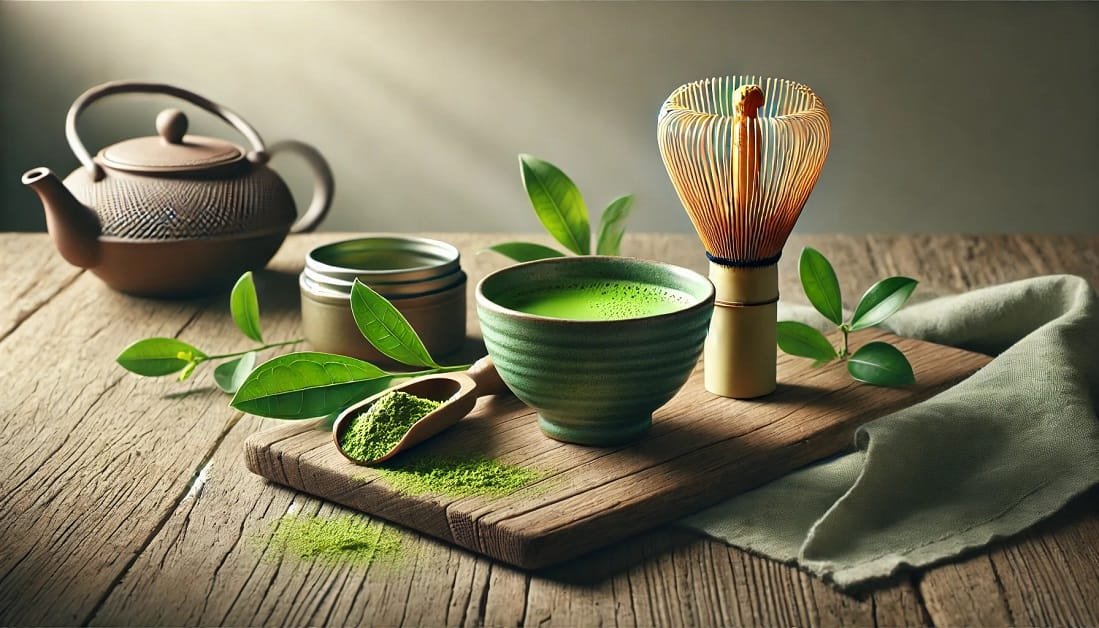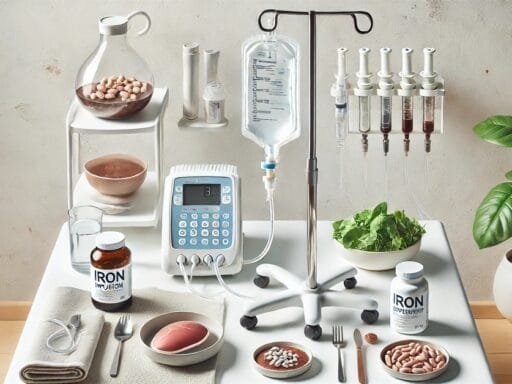Introduction
In recent years, matcha has gained immense popularity as a superfood drink, celebrated for its vibrant green hue and impressive health properties. Packed with antioxidants, vitamins, and a gentle caffeine kick, it has become a go-to choice for health enthusiasts. But when it comes to matcha and pregnancy, many moms-to-be are left wondering: is it safe to indulge in this trendy beverage?
Expecting mothers often turn to nutrient-rich foods and drinks to support their health and their baby’s development. The matcha benefits touted for general well-being, such as boosting energy, improving focus, and supporting immunity, can sound highly appealing. However, questions about caffeine and pregnancy often arise, as matcha contains a moderate amount of caffeine, making its safety a concern during this delicate phase.
This article explores the fascinating relationship between matcha and pregnancy. From its potential advantages to any risks it might pose, we’ll dive deep into the science-backed facts to ensure you make informed choices during this precious time. Whether you’re a matcha enthusiast or new to the world of green tea during pregnancy, you’ll find all the answers you need here.
Let’s uncover the truth about matcha and pregnancy so you can sip with confidence!
Table of Contents
What is Matcha?
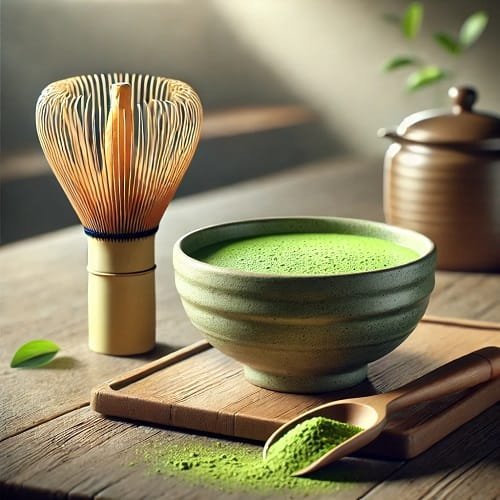
Matcha is a finely ground powder made from specially grown green tea leaves. Unlike regular green tea, where the leaves are steeped in water and discarded, matcha involves consuming the entire leaf, making it far richer in nutrients and antioxidants. Its origins trace back to ancient Japan, where Buddhist monks cherished it for its calming yet energizing properties during meditation.
What sets matcha powder apart from other teas is its unique cultivation process. The tea plants are shade-grown for several weeks before harvest, which boosts their chlorophyll content and gives the powder its vibrant green color. This process also increases the concentration of beneficial compounds, such as catechins and L-theanine.
In addition to being nutrient-dense, matcha tea contains moderate amounts of caffeine, providing a sustained energy boost without the jitters often associated with coffee. The caffeine in matcha is balanced by L-theanine, an amino acid that promotes relaxation and focus, making it an excellent choice for both health and mindfulness enthusiasts.
With its rich history, superior nutrition, and versatility, matcha has earned its place as a global superfood. But what role does it play when it comes to matcha and pregnancy? Read on to explore its safety and benefits for moms-to-be.
Can You Drink Matcha While Pregnant?
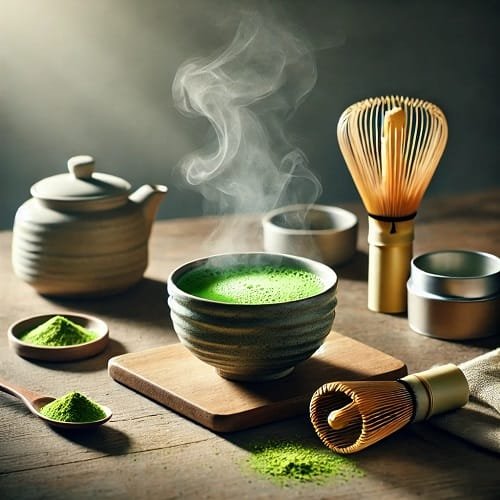
When it comes to matcha and pregnancy, the question most expecting moms ask is: Is it safe to enjoy this popular drink? The answer largely depends on moderation and individual health considerations. While matcha offers numerous health benefits, its caffeine content requires careful attention during pregnancy.
A cup of matcha tea typically contains around 25–50 mg of caffeine, depending on the preparation. Compared to coffee, which can have upwards of 100 mg per cup, matcha provides a gentler alternative. However, experts recommend limiting caffeine intake during pregnancy to 200 mg per day, as excessive amounts can lead to complications such as low birth weight or premature delivery. This means that enjoying matcha in moderation—up to 1-2 cups daily—can fit safely within these guidelines.
It’s also worth noting that the caffeine in matcha is released more slowly into the bloodstream, thanks to the presence of L-theanine. This unique property prevents energy crashes and offers a more sustained boost, making it a potentially preferable choice over coffee during pregnancy.
For safe matcha consumption, opt for high-quality organic matcha and prepare it lightly to avoid overloading on caffeine. As with any dietary change during pregnancy, consult your healthcare provider to ensure it aligns with your personal health needs.
When consumed responsibly, matcha and pregnancy can coexist, providing a balance of health benefits and mindful moderation. In the next section, we’ll dive into the specific advantages this superfood offers for expecting moms.
Benefits of Matcha During Pregnancy
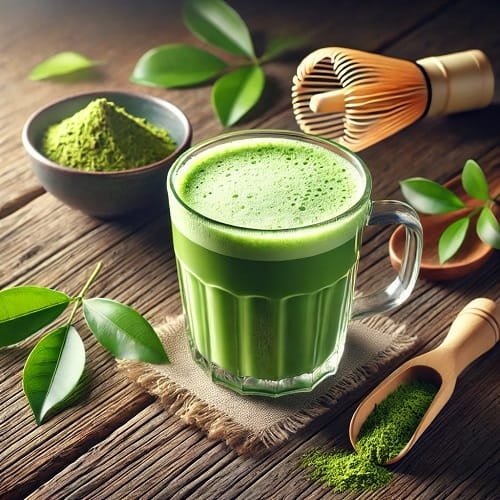
The connection between matcha and pregnancy becomes even more intriguing when exploring the potential benefits this vibrant green superfood offers to expecting moms. From its powerful antioxidants to its natural energy boost, matcha has much to contribute when consumed in moderation.
1. A Rich Source of Antioxidants
One of the standout matcha benefits for pregnancy is its impressive antioxidant content, particularly catechins like EGCG (epigallocatechin gallate). Antioxidants help combat free radicals, reducing inflammation and boosting overall immunity—critical for both the mother and the developing baby. Drinking antioxidants in tea, like matcha, can be a gentle way to support your immune system throughout pregnancy.
2. A Safer Energy Boost
Pregnancy often comes with fatigue, and many moms-to-be seek alternatives to coffee to manage energy levels. Matcha tea provides a sustained energy lift without the jitters, thanks to its unique combination of caffeine and L-theanine. This amino acid promotes relaxation while enhancing focus, making matcha a healthy drink for pregnancy when you need a productive day without a caffeine crash.
3. Packed with Essential Nutrients
In addition to antioxidants, matcha powder contains a variety of vitamins and minerals like potassium, vitamins A and C, and folate, all of which are essential for a healthy pregnancy. Its high chlorophyll content also supports detoxification, while L-theanine promotes mental calmness—perfect for reducing pregnancy-related stress. These nutrients make matcha benefits for pregnancy a worthwhile addition to a balanced diet.
4. Hydration and Enjoyment
Staying hydrated during pregnancy is essential, and matcha tea offers a flavorful and nutrient-packed alternative to plain water. Its versatility means you can enjoy it as a latte, smoothie, or traditional tea, adapting it to suit your cravings.
Incorporating matcha and pregnancy safely can provide a host of benefits for your energy, immunity, and overall well-being. However, it’s important to balance these advantages with mindful consumption, which we’ll explore further in the next sections.
ALSO READ
Managing Jaw Ache During Pregnancy: A Guide for Moms-to-Be
Post Pregnancy Joint Pain: Causes and Effective Solutions
Risks of Drinking Matcha While Pregnant
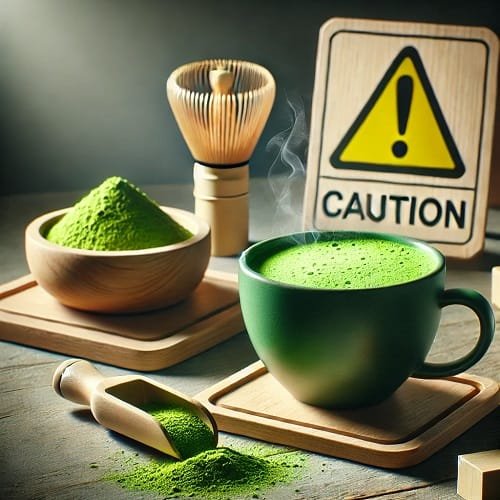
While the benefits of matcha and pregnancy are compelling, it’s essential to consider the potential risks associated with this green superfood. Understanding these concerns can help moms-to-be make informed decisions about their matcha consumption.
1. Caffeine Sensitivity and Pregnancy Risks
Pregnant women are often more sensitive to caffeine, and overconsumption can lead to negative effects such as increased heart rate, insomnia, and heightened stress. High caffeine intake during pregnancy has been linked to risks like low birth weight or premature delivery. Although matcha tea contains less caffeine than coffee, it’s crucial to monitor your intake to stay within the recommended daily limit of 200 mg. For those with caffeine sensitivity in pregnancy, even small amounts of caffeine may require caution.
2. Potential Contaminants in Matcha
Another concern with matcha and pregnancy is the possibility of contaminants, particularly lead. Tea plants can absorb lead from the soil, and since matcha powder involves consuming the entire leaf, this can pose a risk. While high-quality, organic matcha minimizes these dangers, it’s vital to choose reputable brands and limit your intake to 1–2 cups daily. This ensures tea safety for both you and your baby.
3. Risks of Overconsumption
Even with its health benefits, drinking too much matcha can lead to digestive discomfort or excessive caffeine levels. Overconsumption may also overload the body with certain compounds like catechins, which can interfere with iron absorption. Pregnant women already face increased risk of anemia, so balancing matcha with iron-rich foods is essential to mitigate matcha risks.
By being mindful of caffeine sensitivity, avoiding low-quality products with potential lead in matcha, and consuming this drink in moderation, you can enjoy its benefits while protecting your health and your baby’s development. Up next, we’ll explore how to safely incorporate matcha and pregnancy into your routine.
How to Safely Consume Matcha During Pregnancy
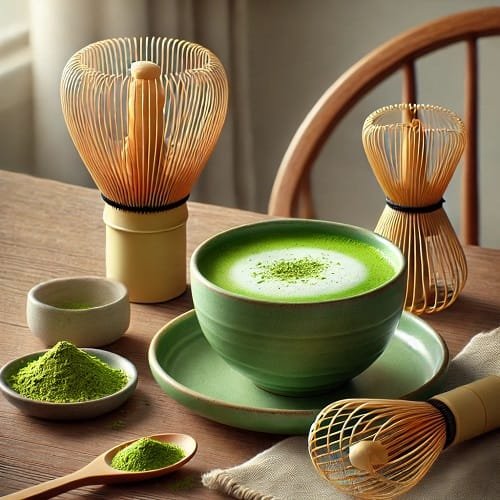
Balancing the benefits and risks of matcha and pregnancy comes down to mindful consumption. When enjoyed responsibly, matcha tea can complement your pregnancy diet while keeping potential risks in check. Here’s how to safely include it in your routine.
1. Recommended Serving Size
To ensure safe matcha consumption, it’s important to limit your intake to 1–2 cups per day. This keeps your caffeine intake well within the recommended 200 mg daily limit for pregnant women, as one cup of matcha tea contains approximately 25–50 mg of caffeine. By sticking to moderate portions, you can enjoy matcha’s benefits without overloading on caffeine or risking unwanted side effects.
2. Choose High-Quality Matcha
Not all matcha is created equal. For the safest experience, select high-quality matcha from reputable brands. Look for organic, ceremonial-grade matcha, which is free from harmful additives and contaminants like lead. Read product reviews and check for third-party testing to ensure your matcha is both pure and safe. Premium options may cost more, but they offer peace of mind during pregnancy.
3. Brew It Right
To minimize caffeine content, prepare your matcha using a smaller amount of powder (about 1/2 teaspoon per serving) and avoid adding extra scoops. You can also dilute your matcha with milk, creating a nutrient-rich latte that’s perfect for pregnancy-safe drinks.
4. Explore Caffeine-Free Alternatives
If you’re particularly sensitive to caffeine or want to avoid it altogether, consider caffeine-free drinks for pregnancy like herbal teas or rooibos. While they don’t offer the same antioxidants as matcha, they provide hydration and relaxation without any caffeine-related concerns. Additionally, limiting matcha intake during the first trimester may be a good precaution for those concerned about early pregnancy caffeine exposure.
By adhering to these best practices, you can confidently enjoy the vibrant flavors and health benefits of matcha and pregnancy while prioritizing safety for yourself and your baby. Ready to tackle common questions? Let’s dive into the FAQ section next!
Frequently Asked Questions (FAQ)
When it comes to matcha and pregnancy, many moms-to-be have specific questions. Here are answers to five of the most common concerns to help you make informed decisions.
1. Is Matcha Safe in the First Trimester?
The first trimester is a crucial phase for fetal development, so caution is advised. While matcha and the first trimester can coexist, it’s best to limit intake to half a cup or skip it entirely during this period, especially if you’re sensitive to caffeine. Opt for caffeine-free herbal teas instead if you’re unsure, and always consult your doctor.
2. Can Matcha Help with Pregnancy Fatigue?
Yes, matcha tea is an excellent natural remedy for pregnancy fatigue. Its moderate caffeine content, combined with L-theanine, provides a smooth and sustained energy boost. Unlike coffee, matcha doesn’t cause energy crashes, making it one of the best pregnancy fatigue remedies when consumed in moderation.
3. How Much Matcha Can I Drink During Pregnancy?
Experts recommend limiting your caffeine intake to 200 mg daily during pregnancy. Since one cup of matcha tea contains about 25–50 mg of caffeine, sticking to 1–2 cups per day ensures safe matcha consumption.
4. How Does Matcha Compare to Other Teas During Pregnancy?
When compared to other teas, matcha has higher antioxidant levels and nutrient density due to its whole-leaf preparation. However, herbal teas like rooibos are caffeine-free and might be better for those who wish to avoid caffeine altogether. Understanding tea comparisons can help you make the best choice for your needs.
5. Does Matcha Contain Harmful Contaminants?
Matcha can absorb lead from the soil, which may be a concern during pregnancy. To minimize risks, always choose high-quality matcha from reputable brands that test for contaminants. This ensures your tea safety and peace of mind.
Conclusion
The journey of matcha and pregnancy is all about balance. This nutrient-rich superfood offers a variety of benefits, from boosting energy and immunity to providing essential antioxidants. However, the risks, such as caffeine sensitivity and potential contaminants, highlight the importance of moderation and mindful consumption.
By adhering to the recommended daily limit of 1–2 cups, choosing high-quality matcha, and consulting your healthcare provider, you can safely enjoy this vibrant drink as part of a healthy pregnancy diet. Compared to other options, matcha tea provides a unique blend of nutrients and calm energy, making it a thoughtful choice for many expecting mothers. Whether you’re exploring pregnancy and tea or curious about green tea benefits, matcha can be a safe and enjoyable addition when consumed responsibly. Remember, every pregnancy is unique, so consult your doctor and share your experiences with matcha to inspire others on their journey.
